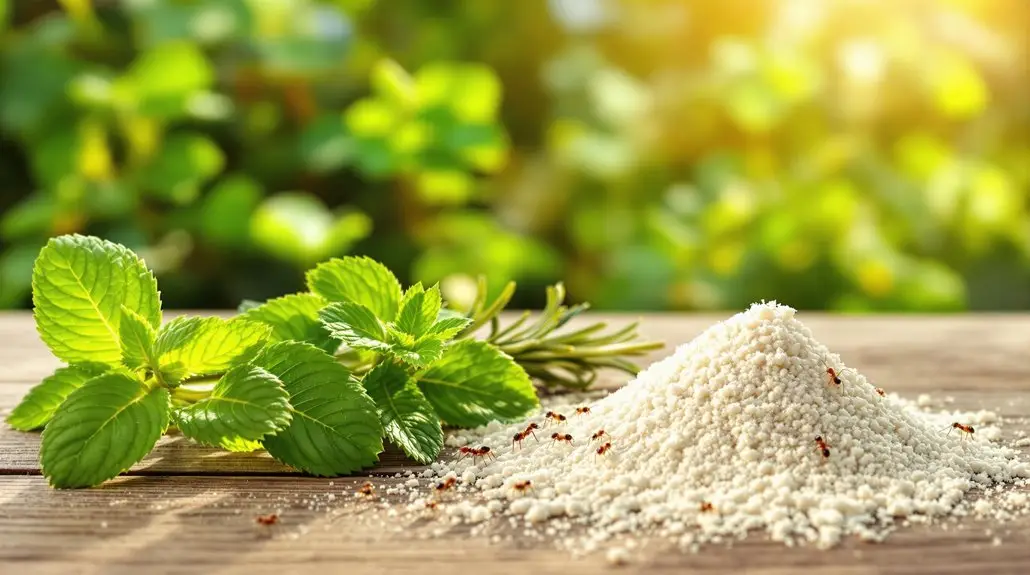You can naturally rid your space of ants without harmful chemicals. Start by using essential oils like peppermint or tea tree to repel them. Vinegar disrupts their pheromone trails, while cinnamon acts as a strong deterrent. For a more potent approach, diatomaceous earth dehydrates ants, and baking soda mixed with sugar can kill them when ingested. Be sure to keep food sources sealed and maintain cleanliness to prevent future infestations. Applying these natural solutions regularly will enhance their effectiveness. If you’re curious about more strategies to tackle this problem, there’s plenty of additional information to explore.
Key Insights
- Use essential oils like peppermint or tea tree to repel ants when sprayed around entry points and trails.
- Create a vinegar solution to disrupt pheromone trails and eliminate food sources for ants.
- Sprinkle diatomaceous earth around nests and pathways to dehydrate and deter ant activity.
- Keep food sources sealed in airtight containers and maintain cleanliness to prevent attracting ants.
- Employ natural barriers like cinnamon or black pepper at entry points to discourage ant infestations.
Understanding Ant Behavior

Ants are fascinating creatures that thrive in complex social structures, and understanding their behavior is key to managing them effectively. One of the most essential aspects of their communication is the use of pheromones. These chemical signals alert their colony to danger, lead them to food sources, and help coordinate group activities like foraging or defending the nest. When you see ants marching in a line, they’re following these pheromone trails, which efficiently guide them to where food is located.
You might be surprised to learn that touch also plays a role in their communication. When an ant returns from a successful foraging trip, it shares information through antennae contact, reinforcing the bond within the colony. This form of interaction contributes to their collective decision-making, allowing the colony to adapt to environmental changes effectively. Ants can also be managed using eco-friendly solutions that align with their natural behaviors.
Ant species can vary considerably in their foraging strategies, often tailored to their environment. Factors like temperature and humidity influence their patterns, as natural selection favors those who conserve resources effectively.
Within the colony, there’s a clear division of labor. Worker ants focus on tasks like foraging, while soldier ants protect the nest. This social structure shapes how ants communicate and make decisions, ensuring that each member plays an essential role in the colony’s success.
Effective Natural Repellents
When dealing with an ant invasion, effective natural repellents can be your best allies. These options not only help protect your home but also support a holistic approach to pest control.
Here are four powerful natural repellents to take into account:
- Essential Oils:
- Peppermint Oil: Mix 10-20 drops with 2 cups of water and spray around baseboards and windows.
- Tea Tree Oil: Combine 5-10 drops with water for a robust spray, or use cotton balls in ant-prone areas.
- Household Items:
- Vinegar: A 1:1 mixture of white vinegar and water works wonders. Spray around entry points to mask pheromone trails.
- Cinnamon: Sprinkle ground cinnamon in infested areas. Its strong scent repels ants effectively. Regular application enhances effectiveness to ensure ongoing protection.
- Natural Barriers:
- Diatomaceous Earth: Sprinkle this around ant trails. It dehydrates ants on contact.
- Cornmeal: Spread this around your home. Ants consume it and die when they drink water.
- Plant-Based Repellents:
- Mint and Bay Leaves: Plant these around your foundation. They deter ants while adding beauty to your garden.
- Citrus Peels: Simmer peels in water, then spray the infused liquid in ant-prone areas.
Powerful Natural Killers

For those facing a persistent ant problem, powerful natural killers can offer an effective solution. One of the strongest options is diatomaceous earth, which is made from fossilized marine phytoplankton. Its microscopic, razor-sharp edges cut through ants’ exoskeletons, causing them to dehydrate and die. By sprinkling it around ant trails, baseboards, and entry points, you can disrupt entire colonies. Additionally, it’s important to note that Argentine and Odorous house ants are prevalent in homes, making this method particularly effective.
Vinegar and lemon juice also pack a punch. Mix equal parts of vinegar and water to kill ants on contact, and spray this solution around entryways and windows to repel them. Lemon juice, when mixed with water, destroys scent trails, making it harder for ants to navigate. These simple combinations not only eliminate current ants but also help deter future infestations.
Baking soda and borax are another duo to contemplate. Baking soda creates a lethal chemical reaction when ingested, while borax disrupts ants’ digestive systems. By mixing baking soda with powdered sugar, you can attract ants and ultimately kill them.
Similarly, combining borax with sweet foods can create an effective bait that ants carry back to their nests.
Lastly, boiling water and soap solutions are powerful. Pouring boiling water directly into an anthill can instantly eliminate ants and destroy their nests. A soap solution can also be sprayed directly on ants or poured into anthills for immediate results.
With these natural killers, you’ll reclaim your space from troublesome ants in no time.
Tips for Application
Effective application of natural ant repellents is key to successfully managing an infestation. To help you tackle this issue head-on, here are some practical tips that you can easily incorporate into your routine:
- Spray Solution: Mix equal parts of vinegar and water in a spray bottle. Spray on ant trails and wipe them away with a damp paper towel to eliminate their scent. For extra potency, use a lemon juice and water mix around entryways. Ants leave pheromone trails to food sources, so disrupting these paths is crucial. NaturePest offers organic pest control solutions that complement these natural methods.
- Diatomaceous Earth: Lightly sprinkle food-grade diatomaceous earth around ant trails and nests. This natural powder dehydrates ants upon contact, effectively reducing their numbers.
- Essential Oils: Combine peppermint or tea tree essential oil with water and spray around baseboards and windows. You can also place cotton balls saturated with these oils in frequent ant areas.
- Citrus Peels: Place citrus peels like orange or lemon rinds where you see ants. This masks their scent trails and naturally deters them.
Preventing Future Infestations

To keep ants at bay, it’s essential to focus on prevention strategies that make your home less inviting to these pests. Start by clearing food sources. Remove any food left out in the open, and clean up spills and crumbs immediately. Make it a habit to wash and put away dirty dishes promptly. Seal open bags of pet food in air-tight containers, and maintain a tidy kitchen to reduce attractions that draw ants in.
Utilize natural repellents to create a barrier against future infestations. You can sprinkle black or cayenne pepper along baseboards and behind appliances. A spray made from peppermint essential oil and water works wonders around baseboards and windows. Additionally, tea tree oil can be an effective deterrent when applied in areas where ants are seen.
Employ common household items to further protect your space. Wipe down surfaces with a mix of white vinegar and water to disrupt ant scent trails. Sprinkling food-grade diatomaceous earth around entry points also helps keep ants at bay. For a DIY bait trap, mix baking soda or borax with honey and water. Diatomaceous earth is particularly effective as it kills ants by drying out their exoskeletons.
Lastly, create physical barriers. Ground cinnamon can be sprinkled at doors and windows, while cinnamon sticks around the garden offer extra protection.
Frequently Asked Questions
Are Natural Ant Repellents Safe for Pets and Children?
When considering natural ant repellents, you need to be cautious about their security for pets and children.
While some options, like borax and essential oils, can be effective, they carry risks if ingested. Always keep these substances out of reach.
Vinegar and spices might be more secure alternatives, but you’ll still want to ascertain your little ones and furry friends aren’t exposed.
Frequent applications may be necessary, so stay vigilant for their security.
How Long Do Natural Ant Repellents Last Before Needing Reapplication?
You might be wondering just how long those natural ant repellents actually last before you need to reapply them. The answer varies!
Mint and peppermint oils generally last a few hours, while tea tree oil and lemon eucalyptus need reapplication every few days.
Coffee grounds hang in there until they’re disturbed, but vinegar fades quickly. Staying consistent with your applications is key to keeping those annoying ants at bay!
Can I Mix Different Natural Repellents for Better Effectiveness?
Yes, you can mix different natural repellents for better effectiveness!
Combining ingredients like cayenne pepper with cinnamon or using essential oils like peppermint and tea tree can amplify their repellent properties.
You’ll create a broader spectrum of coverage that targets various ant behaviors.
Just remember to reapply your mixtures regularly to maintain their potency, and you’ll likely see a significant reduction in ant activity around your home.
What Should I Do if Ants Return After Treatment?
If ants return after treatment, picture them marching back, disrupting your peaceful space.
First, check for new entry points and seal them tight.
Keep your home spotless—crumbs and spills invite them back like an open door.
Try using natural deterrents like essential oils or vinegar solutions to mask their trails.
Regularly inspect your yard, too, clearing debris that attracts them.
With consistent effort, you can reclaim your space from those unwelcome visitors.
Are There Specific Types of Ants That Natural Remedies Work Best On?
Absolutely, natural remedies work best on various ant species.
For general infestations, diatomaceous earth and vinegar are effective.
If you’re dealing with fire ants, boiling water and boric acid can be game-changers.
For odorous house ants, try a mix of lemon juice and baking soda.
Remember, combining these methods often yields better results, so don’t hesitate to experiment a bit.
You’ll find what works best for your specific situation!
Defend Your Home Naturally: Ant Control Made Easy with NaturePest Holistic Pest Control!
In your quest to keep ants at bay, remember that a single colony can house up to 500,000 ants! By understanding their behavior and using effective natural repellents and killers, you can reclaim your space without harsh chemicals. Keep applying these methods consistently, and you’ll not only tackle the current invasion but also prevent future infestations. Embrace these holistic strategies with the help of NaturePest Holistic Pest Control, and enjoy a pest-free environment that’s secure for you and your loved ones. Don’t wait—take action now and experience the natural, effective solution to ant control!



